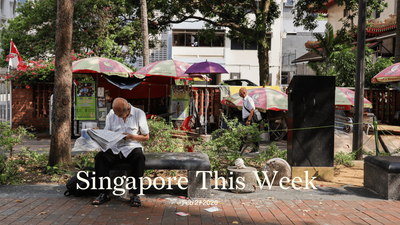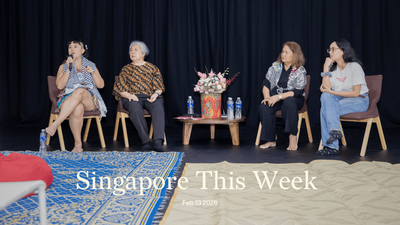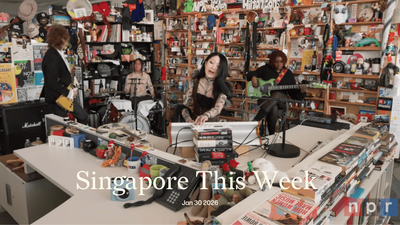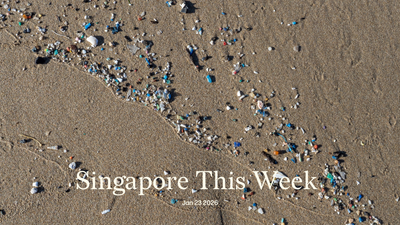Our picks
Society: ‘They don’t want to sit with us’
HealthServe launched Singapore’s first migrant worker mental health programme in 2019. When the government confined workers to their dorms for extended periods during Covid, the local charity’s helpline aided thousands, their anxieties captured by the deported migrant poet Md Sharif Uddin:
Locked in four walls. Darling, I’m getting lost / I’m getting old.
Since then, privileged Singapore residents have become a bit more aware of the mental health struggles that migrant workers face, and the government a tad more empathetic. “To our migrant brothers, we recognise that it’s not easy because you are far away from your home and your families, and sometimes it can be very difficult,” said Dinesh Vasu Dash, minister of state for manpower, while announcing official support to HealthServe’s expanded programme to train selected workers in “psychological first-aid skills”, the first line of support for peers in distress. Over the next two years, 20 roadshows will also teach workers about self-care and the mental health resources available to them.
Any aid is welcome, given the formidable body of evidence showing that mental health issues are widespread among migrant workers—15-20 percent according to one estimate. And kudos too, to the government for collaborating with civil society on such a vital concern. Yet, even as we laud these efforts, it is crucial to keep hammering away at the systemic issues which create conditions for mental health crises in the first place. Jom has written about them often, most recently here, here and here. This time, we thought they’d be best presented in the workers’ voices themselves.
The terrible living conditions: It’s like the lack of oxygen. Some time, you could feel the lack of oxygen. You know like the humidity, like the [heat]);
The pitiful food: This catering food cannot eat all. Little bit only can eat. [That’s why we drink] Red Bull, [lots of] energy drinks;
The harsh working environment: Sometimes we feel back pain, sometime migraine […] too much headache. Too much pain...
The surrendering of rights and dignity: we are very scared to complain […], anyway because we work here, we take care of our family. Our family depends to me…[…] [I’m] scared the company catch me, send [me back] to Bangladesh and India;
The deception and the debt bondage: Some company don’t give the salary timely. […] So, in this time, we don’t have money to top up. We have a lot of loan in our country.[…];
The shame: …the locals don’t want to talk to us. Even they don’t want to sit beside, behind us [on the] MRT, bus they don’t want to sit with us.
These voices were housed in a 2023 study, and together are illustrative of our global city’s exploitation of cheap labour. Mental health assistance is a small step. We have many giant leaps yet to make.
Society: Anatomy of a death in Singapore Inc
Ko Wah was 78 years old in 2019, “independent of [sic] ALL activities of daily living and instrumental activities of daily living,” as a doctor would later certify. But life can turn in an instant. A van hit him in a basement carpark in Jurong, leaving him “bedridden and ‘permanently mentally incapacitated’, being ‘fully dependent on caregivers for all his activities of daily living’,” a judge noted this week. After the accident, Jonathan Ko, his son and administrator of the estate, sued the driver and his firm for damages.
NTUC Income (later rebranded as Income Insurance), their insurers, assumed conduct of the defence. Income instructed lawyers to “completely deny the claim for pain and suffering”, arguing that because Ko had been comatose the entire time, he “could not have appreciated any pain and suffering at all.” Yet the defence counsel himself acknowledged that Ko was at times “alert” and that the “uncontroversial legal position” is that even when a person is unable to feel pain and suffering, they’re still entitled to damages. Income was given a chance to “explain their insistence on such an unyielding and apparently unreasonable position”. Income responded as “Income” might: “simply declined to explain”.
In awarding over S$417,000 to the estate, the judge’s first line: “This is a judgment that documents NTUC Income’s wholly unreasonable behaviour.” Among other criticisms: Income’s “casually impersonal stonewalling that some would associate with the worst administrative processes”; and Income’s refusal to cover the bedridden man’s ambulance rides—take Grab, lah—or the milkpowder he was forced to subsist on because of the accident, arguing, as “Income” might, that he use a “more cost-effective nutritional milk alternative”. To scan the annexes of the judgement, documenting expenses fought for, is to immerse oneself in the depressing banality of a caregiving family choked by the profit motive. A selection:
| 8 Sep 2019 | KTPH invoice for white drawsheets | 72.85 |
| 5 Oct 2019 | My Pharmacy Receipt (urine bags, syringes, pain killers, tweezers, saline solution etc.) | RM 556 ≈ $167.31 SGD |
| 16 Jan 2020 | NUH invoice (aspirin) | 7.50 |
| 16 May 2021 | Phlegm suction device | 199 |
| 13 May 2022 | Home Nursing Foundation (subsequent visit) | 79 |
| 17 Sep 2023 | Valumarts Bendemeer (batteries) | 5.80 |
There will be no raging as you go, in Singapore Inc, but simple scraping, and accounting. Lest it be forgotten, Income’s biggest shareholder is NTUC Enterprise, whose purpose is to “Enable better living”, and whose chairman is a former politician. Ng Chee Meng, NTUC’s boss and current politician, expressed “deep concern” over Income’s handling of the claim, but was “heartened that Income has accepted the court’s judgment upon reflection, and recognised that they could have done better.”
“We” over “me”. Ageing well. Protecting our most vulnerable. If you hear these mantras often enough, you will eventually believe them, and forget about a system that puts profits first to enrich an elite class. You’ll also soon forget the name of the person who, while his being was being reduced by bean counters, passed away a year ago: Ko Wah.
Politics: How to win elections by smearing your opponent
In 1987, with global communism on its deathbed, the ruling People’s Action Party (PAP) somehow unearthed a Marxist Conspiracy in our little red dot. Ten years later, and some 32 years after independence, it again proved its investigative brilliance, when it revealed in our midst an “anti-Christian, anti-English-educated, Chinese chauvinist”. Lawyer Tang Liang Hong, well-known by then, only earned that sobriquet after deciding to contest in the general election as part of a Workers’ Party (WP) team featuring JB Jeyaretnam. During the campaign, the PAP’s leaders labelled him a bigot; the mainstream media dutifully parroted the accusation; and the PAP won Cheng San GRC with over 54 percent of the vote. Tang had lodged police reports against 11 PAP leaders for those statements. After the election, he paid the price: they sued him for defamation (and later won). By then he’d fled the country, and would eventually settle in Australia, also spending time in Malaysia and Hong Kong, where he died last week.
Tang, as academic Cherian George wrote in The Airconditioned Nation in 2000, had studied Indian dance when young, and could read and speak Malay. “His quarrel was with the over-Westernisation of Singapore, and he seemed to believe that Malay and Indian cultures were equally deserving of protection as Chinese.” Tang’s two daughters married non-Chinese men, and at his wake last week, there was a Christian service where one daughter’s church group sang and prayed. Tang was, in short, a really poor “anti-Christian, anti-English-educated, Chinese chauvinist”.
The PAP’s real worry about him was probably the same existential electoral one it has had since the 1950s: being outflanked by politicians who could better appeal to working-class folk steeped in their mother tongues. Over the past week, numerous Singaporeans have lauded Tang’s contributions to society on Facebook. George called him “among the biggest victims of Singapore’s political system of the last 30 years” (and has made available online his chapter about Tang). Leon Perera, former WP MP, said history will remember Tang kindly. Tommy Koh, ambassador-at-large who taught Tang at NUS, detailed several interactions with him over the years. One commenter asked about the government’s portrayal of him in 1997. Koh responded: “character assassination was often resorted to by desperate politicians.”
Earth: X marks the spot
Only a fifth of the world’s oceans have been explored, a paradox given that they hold 96.5 percent of all the planet’s water, cover 71 percent of its surface, and sustain life as we know it. This week, Singapore embarked on its first deep-sea scientific exploration since adopting the United Nations Biodiversity Beyond National Jurisdiction Agreement, in 2023—a milestone that signals its growing commitment to protecting marine biodiversity.
The 24-day voyage will take scientists to the Monsoon Rise in the Christmas Island Seamount Province, a largely uncharted chain of underwater mountains in the eastern Indian Ocean. The mission, a collaboration between NUS and US nonprofit OceanX, brings together 14 researchers from NUS’s Tropical Marine Science Institute and Lee Kong Chian National History Museum (LKCNHM), two from NTU, and others from Fiji, Indonesia, Thailand and Vietnam. They set sail on October 7th aboard the OceanXplorer, an 87-metre retrofitted superyacht that OceanX described as the world’s most advanced exploration, research and media vessel.
Aboard the OceanXplorer, a seafaring laboratory fitted with remotely operated vehicles and submersibles capable of reaching depths of 6,000m and 1,000m respectively, researchers will map biodiversity across more than 17,000 sq km of deep-sea terrain, roughly the size of 2.4m football fields. Specimens collected will be curated at LKCNHM, with findings published in peer-reviewed and open-access journals to advance ocean conservation and management. But more than “a voyage of discovery,” said Tan Eng Chye, NUS president, the expedition—backed by a S$6m National Research Foundation grant—represents multinational efforts towards a “better future” for the planet. “In the old, extractive paradigm, you take, you use and you exploit,” Dr Vivian Balakrishnan, foreign affairs minister, told The Straits Times. He believes “in a future that creates real value by protecting and sharing ideas, discoveries, and applications.”
Beyond scientific investigation, OceanX—founded by billionaire investor Ray Dalio and son Mark—seeks to make ocean exploration as captivating as space travel, which has long commanded greater funding and attention (thanks in large part to galaxy-gazing billionaires Jeff Bezos and Elon Musk). Unsurprising perhaps, since it’s “a lot easier to send people into space”, noted Gene Carl Feldman, an oceanographer at NASA’s Goddard Space Flight Center, than to the bottom of the deep ocean with its intense pressures, literally. The OceanXplorer also doubles as a floating film studio with state-of-the art production suites. “Titanic” director James Cameron, also an explorer of the deep, helped design parts of the ship and its submersibles. By fusing science and storytelling, such as through collaborations with NatGeo and BBC Earth, the Dalios hope to spark public wonder and, thus, a shared will to protect fragile marine ecosystems. For Singapore, an island nation vulnerable to rising seas, partnerships like this can deepen its role in global efforts to safeguard not only the high seas, but the waters that surround its shores.
History weekly by Faris Joraimi
This October, Salem in the north-eastern US turns again into a major Halloween destination, commodifying its notorious “Witch Trials” of 1692-93. A weird way to commemorate women executed for witchcraft, surely. While Halloween has grown popular in Singapore too, there are older, more meaningful connections between Salem and our region. Salem’s city seal adopted in 1839 depicts an Acehnese man, with a head-cloth, coat, and parasol, surrounded by palm trees and pepper plants. The Latin motto below him reads, “To the farthest corner of the rich Indies.”
The “Indies” did bring them riches: Sumatran pepper, re-exported throughout North America and to Europe, made Salem the US’s sixth largest seaport and its richest city (by income per capita). In 1797, the Salem seafarer Jonathan Carnes first sold an abundant cargo of black pepper from west Sumatra, for a 700 percent profit. Thereafter, Salem traders regularly visited ports subject to the Sultanate of Aceh. The Sumatrans didn’t always do what they wanted. In 1831, Po’ Muhammad (also known as Tunku Yamat), who ruled the port of Kuala Batu, refused assistance to the Salem vessel Friendship, which had been taken by “pirates”, who murdered some of the crew and stripped its cargo. The survivors were eventually helped by another local leader, Po’ Adam, to reach nearby American vessels and retake the Friendship. Still, the US government retaliated, sending a gunboat to bombard Kuala Batu, killing its defenders including some noblewomen and Tunku Yamat himself. This was the first US military campaign in Asia, soon followed by a second Sumatra campaign in 1838.
Violence notwithstanding, the romance of the Sumatra trade persisted in Salem, long after its shipping declined. Its most visible reminder faces an uncertain future. Last year, community members who consider the city seal racially offensive to Asians complained to Salem’s Race Equity Commission. The City Council is still deliberating; its special task force includes Michael Feener, Salem-born historian of Indonesia and former associate professor at NUS’s history department. Critics of the complaint say the racism accusation lacks context and that the seal represents a cosmopolitan outlook rather than inward-looking nationalism. Dane Morrison and Nancy Schultz, authors of Salem: Place, Myth and Memory, wrote that the seal offers “a fresh way to envision connections, not just between the local and the national, but also among the local, national, and global.” The Acehnese have chimed in. Muzakir Manaf, governor of Indonesia’s Aceh province, wrote to Salem’s mayor, “we respectfully hope that the historical context of the image, as a gesture of mutual respect rather than a stereotype, will be considered in full.” Salem historian Donna Seger doesn’t have high hopes after attending hearing sessions trying to prove the seal’s racism. But Salem can’t lose Sumatra, she says on her blog. The Acehnese figure in Salem points to human relationships at the heart of all trade, for better or worse. “When that figure is stripped from Salem’s seal,…all we will have left is a commodity.”
Arts: The more we get together
You’re an independent artist in Singapore looking for studio space. Commercial rates are extortionate, but you’re reluctant to apply for subsidised arts housing from the state because of the rigid terms and conditions. Neither do you feel inclined to start a company with others; you’re happiest as a free spirit, not funnelled into an institution with a singular vision. But you’d like a bit of legal protection, and a break from hustling all the time. What do you do? You could start a cooperative, or a co-op. This is a member-owned, democratically run organisation where a group of people come together to pool resources, distribute decision-making and diffuse financial risk. You and your friends could each chip in a modest amount, say, S$1,000 a person, and share your spaces, equipment, networks and administrative know-how—then lease your premises out or create membership tiers that would help split the rent.
Last Friday, several dozen arts workers gathered to figure out how to do just that. This intimate session was convened by Post-Museum, an independent cultural and social platform, part of a longer-term reckoning with the shuttering of indie spaces in quick succession, most recently The Projector. The evening was led by a group of recent Yale-NUS College graduates with day jobs in the public sector, but also with a passion for sustainable placemaking and ground-up community-building. Over 100 artists responded to their survey exploring potential artist co-op models in Singapore with both caution and curiosity. While useful state-run versions of these community spaces exist, such as the Arts Resource Hub, artists desire more autonomy over their decision-making and resource allocation, and perceive current funding systems as “centralised and gatekept”. Almost 60 percent of respondents cited a lack of affordable spaces; another 75 percent said they’d join a co-op for collaboration opportunities.
These egalitarian models aren’t new. Across the Causeway, the FRIENDS Craft Cooperative benefits furniture and pottery artisans, where every member has voting rights and has negotiated a democratic share of profits from work sold. Post-Museum itself has always been invested in alternative ways of circulating and exchanging labour and capital; its Singapore Really Really Free Market is based on a gift economy, a temporary market where all goods and services are offered for free, whether that’s a haircut or secondhand clothing. Will we see a swell of creative co-ops in the years to come? We’ll need a few conceptual shifts, from a focus on short-term gains to longer-term sustainability, from the ethos of every-man-for-himself to no-man-is-an-island. Individuals will have to embrace both the pleasures and frictions that come from nurturing collectivity. It won’t be easy, particularly in an era defined by superstar capitalism and an unforgiving economy. Though in the struggle, perhaps, is the joy; and if success comes, then so will a model that can inspire other sectors.
Faris Joraimi, Abhishek Mehrotra, Corrie Tan, Tsen-Waye Tay, and Sudhir Vadaketh wrote this week’s issue. Sakinah Safiee contributed.
If you enjoy Jom’s work, do get a paid subscription today to support independent journalism in Singapore.








